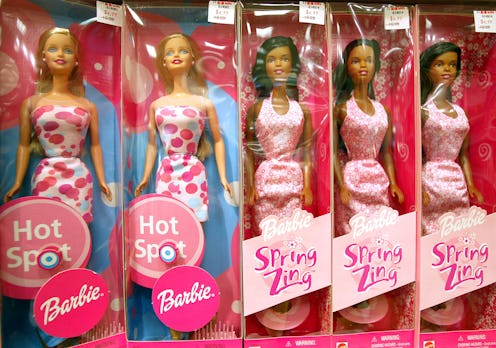Life
Meet "Illegal Immigrant Barbie"
There are certain kinds of humor that can tackle sensitive topics, make important points (satirical or otherwise), and allow their audience to think and laugh all at the same time. Unfortunately, the Points In Case idea for an "Illegal Immigrant Barbie" really doesn't fall into that category. For one thing, it really isn't funny. And if you're going to try to make jokes about serious subjects, there are good ways to do it and bad ways to do it.
The "Illegal Immigrant Barbie" in question was part of a series in Points in Case, a comedy site specializing in "irreverent humor," which featured ideas for new Barbie dolls for the 21st century. At first glance, the idea sounds great, right? After all, Barbie's perpetual smile and relentless perfection has always seemed very 1950s to me, and despite her many careers, Mattel's efforts to make Barbie more 21st-century-esque haven't always gone well. At all. So if a humor writer wants to take a crack at updating Barbie, there's a lot of material to work with.
But the piece didn't really use any of it.
Instead, they included, among other uninspired Barbies, the almost cartoonishly offensive "Illegal Immigrant Barbie." And instead of attempting to play off of the fact that our society refuses to treat our growing population of undocumented immigrants like anything but a collection of negative stereotypes...they described "Illegal Alien Barbie" as a collection of negative stereotypes.
Or more exactly, they described her like this:
Illegal immigrant Barbie is tethered to a bunch of children and comes with a compass and a coyote. Her hair is unkempt and her cheeks lack the rosy glow of the 20th century Barbies. She is armed with wire cutters and sandwiches wrapped in tin foil. She clutches Ken's phone number in the event that she is detained by the Border Patrol.
Because obviously this portrayal is just automatically hilarious. That's why you hear bigots talking about undocumented immigrants in exactly this way with a completely straight face.
Maybe the "humor" is supposed to come from the idea that the doll that positions herself as the epitome of female perfection would ever fall so low as to be an undocumented immigrant? In which case, that's also pretty offensive.
Either way it really isn't funny.
Because here's the thing about comedy. You can handle all kinds of offensive topics. You can even say really offensive things. But if you're going to do that, you need to consider what — and who — you're asking your audience to laugh at. For instance, are you asking them to laugh at toy makers or at undocumented women?
There were a lot of potential directions this post could have gone in without being offensive, without asking people to laugh at "Illegal Aliens" or (to a lesser extent) lesbians or women with hot flashes.
For instance, they could have tried poking fun at the way Barbie always wears makeup by giving her a manual labor job ("Of course, she will still wear her signature eyeshadow on the construction site!"). Or maybe taking a shot at our terrible economy by making her a 20-something living with her parents ("Here we see Barbie checking Craigslist for a job!"). Or even just falling back on the classic point about Barbie's unrealistic proportions ("But of course the most shocking Barbie of all is one who is anatomically correct!")
Any of those could have been funny. Any of those would have been poking fun at someone other than one of the most vulnerable social groups in the country, undocumented women, who not only face the very serious prejudices listed in this post, but also have limited protection from violence and exploitation.
There has long been a debate about where the lines are with offensive humor. After all humor has the power to make us think, to build new connections and provide novel perspectives, to be transformative and powerful. So where are the lines between that and being just plain offensive and mean spirited?
Well, the classic "comedy should punch up, not punch down" rule is usually a good place to start. Because using comedy to "punch down" — that is, as a way of ridiculing those with less power and privilege in society — then you are by definition not transformative, just reinforcing the status quo. And usually doing it with sad, tired jokes to boot.
Image: Giphy
